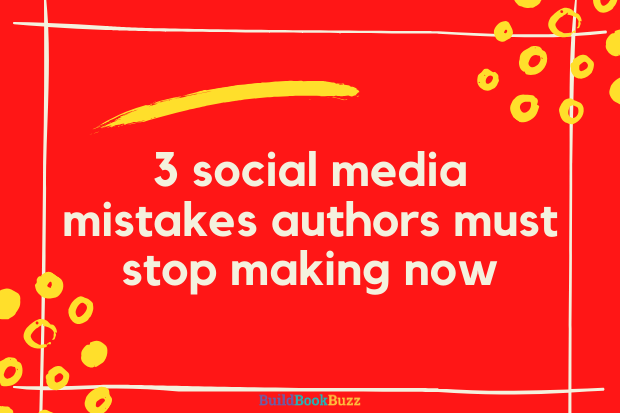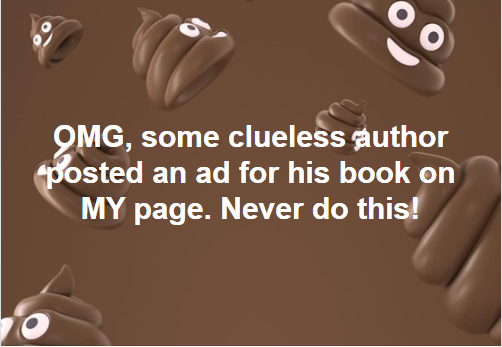3 social media mistakes authors must stop making now
One of the upsides of social media is also one of its downsides: It’s so easy to use.
Anybody can create a Twitter account and start using it immediately. It doesn’t take long to set up a Facebook personal or fan page. LinkedIn? Same thing. Instagram? Yup. You can be rolling along quite quickly.
So how can that be a bad thing?
If you’re using these tools for book promotion and don’t know what you’re doing, you run the risk of:
- Under-utilizing them (often because you’re afraid of making the same mistakes you see others make).
- Using them inappropriately for promotion, which makes all that time you spend on your social networks a total waste.
Mistakes to avoid
I see more of the latter, so let’s focus on those tactics I’m seeing that are counter-productive. For your book’s sake, please stop doing the following:
1. Posting promotional messages on other people’s Facebook timelines.
I saw this only last week on a friend’s profile. Rather than tell you what happened, I’ll show you:
It has happened to me, too. For example, after an author I don’t know in real life friended me on Facebook, she began posting links to her book’s website on my timeline. Just a link — nothing more. No commentary, no questions, no text. Just a URL.
I don’t buy or read books on her topic so I’m not in her target audience. More importantly, though, I don’t like her using my personal Facebook space as a billboard for her book.
Even authors I know and openly support don’t do this, so why would a stranger? Because she doesn’t know better . . . and she hasn’t taken the time to learn.
You’re smarter than that.
(For more on Facebook faux pas, read “How to get unfriended on Facebook.”)
2. Tweeting “buy my book,” “buy my book,” “buy my book” repeatedly.
Don’t be like the poet whose entire Twitter feed was copies of the same message asking people to check out her new book on Amazon. No doubt someone told her she should be promoting her book on Twitter, so she did that without first learning how to use that platform.
It’s okay to tweet “my health book that will save your life is now available here,” or “read a sample chapter of my espionage thriller here,” now and then. Limit it to 20 percent of your content, though. The remaining 80 percent of your messages should be interesting, entertaining, or helpful, not self-serving.
One author new to Twitter recently noted that after joining that social network the day before and tweeting several times, nobody engaged with her. She wondered what she was doing wrong.
Her most obvious mistake was expecting results of any type in 24 hours. In addition, four of her seven tweets promoted her book — about four too many to start out. This approach is the real life equivalent of trying to sell life insurance to party guests as soon as you walk in the room.
Don’t do it.
3. Adding people to your e-mail list without their permission.
You won’t get arrested for doing this, but you could get lose your email service provider account. That can happen if too many people you’ve added report your messages as spam.
You must get a person’s permission to add them to your mailing list. It’s called “opt-in” marketing, which means that they “opt” — choose– to join your email list. Anything that isn’t opt-in is considered spam.
Your e-mail service provider (MailChimp, Mad Mimi, Constant Contact, ConvertKit (that’s an affiliate link), etc.) will have information about this, so please take the time to find and read it.
I don’t want you to be dealing with bigger problems later.
Learn first, act second
The best way to avoid these common mistakes is to spend some time learning how to use any social network before creating an account. You’ll find lots of helpful how-to articles and videos online.
Consider taking an online course, too. When I need to learn how to do something new, I take a Udemy course (that’s my affiliate link). Because there are often several course options, I read the course descriptions carefully and check the reviews.
Also study how the experts use the platform you need to master. For example, if you watched several YouTube videos about Pinterest from the same person, pull up her Pinterest account to see how she uses it.
Adopt the tactics you’re comfortable with, discard those you don’t like.
If you apply a “learn first, act second” approach to social media, you’ll be less frustrated and more productive.
Sometimes, we need someone to hold up a mirror for us, so . . . what types of social media mistakes have you seen authors make?
(Editor’s note: This article was first published in October 2012. It has been updated and expanded.)
Like what you’re reading? Get it delivered to your inbox every week by subscribing to the free Build Book Buzz newsletter. You’ll also get my free “Top 5 Free Book Promotion Resources” cheat sheet immediately!



Thank you, Sandra. As usual, you provide such useful information; I always learn something new from your posts.
Belinda.
Thank you, Belinda! I’m so glad it’s helpful — and you’re nice to let me know that.
: )
Sandy
It is amazing to me people still have not learned that you cannot put people on your mailing list unless they agree to be added.
An approach. When I am speaking/training I have a drawing for my book and inform the group that if their card is put into the drawing, I will be adding it to my mailing list….no problem then–I have gotten their permission.
Kathy, I was amazed when a moderator of a well-respected online writer’s community automatically added me to her list when I joined the (paid) forum. She was certainly leveraging her leadership position — but not doing it in a very smart way.
Do you also have a sign-up form on your website?
Sandy
Hi Sandra. I appreciate your observations. I don’t know much about using Facebook, Twitter or LinkedIn to my advantage. At this point I can’t find time to delve deeper. I don’t want to be quilty of ignoring protocol. I apprectiate any tips I can pick up easily.
I just found out you are friends with one of my writer friends, AAN.
Hope, all you need is good old Upstate New York common sense and you’ll do fine with social media!
Sandy
Very important point about Face Book. I consider someone’s FB wall a boundary issue. It’s lovely to be warm but it’s quite another to assume a relationship that isn’t even there.
Even if one knows one very well I don’t think people pop-in on a casual basis anymore and say, “Hi, I was in the neighborhood.”
Thanks for an interesting post.
You’re welcome, Mary Jane. Thanks for taking the time to read and comment. I appreciate it.
Sandy
I’ve read your stuff b/f, Sandy. You keep going and helping us with your great advice.
Thank you, Mary Jane! I’m so glad it’s helpful!
Sandy
I was laughing at myself when I was reading your message. I have learnt to avoid being ‘salesy’in my post. Thanks for the eye opener.
You’re welcome, Andrew. It’s even more important now, during a pandemic, to understand how to do this properly.
Sandy